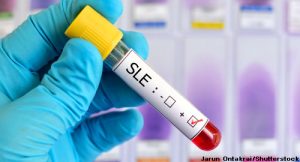 Early Data Show Promise for CAR T Cell Therapy in SLE & Beyond
Early Data Show Promise for CAR T Cell Therapy in SLE & Beyond
SAN DIEGO—At a Nov. 14 session of ACR Convergence 2023, Georg Schett, MD, presented updated experimental data demonstrating remarkable and durable efficacy for chimeric antigen receptor (CAR) T cell therapies in systemic lupus erythematosus (SLE), autoinflammatory myositis and systemic sclerosis.1
Background
CAR T cell therapies are cellular therapies, genetic therapies and immunotherapies. T cells collected from a patient’s blood are genetically engineered to express CARs that can bind to a B cell marker, such as CD19. After the patient receives chemotherapeutic agents for lymphodepletion, these CAR T cells are reinfused into the patient and—because they are targeted at CD19—they kill B cells.2
In relapsed or refractory B cell cancers, CAR T cell therapies directed at B cell antigens have led to profound, long-lasting responses in many patients. Six CAR T cell therapies are now approved by the U.S. Food & Drug Administration (FDA) for treating patients with blood cancers, but none is approved for patients with an autoimmune condition.
Due to the underlying pathophysiology of certain autoimmune diseases, such as SLE, scientists have long been interested in B cell depletion as a treatment approach. However, clinical trials of rituximab, a monoclonal antibody depleting B cells, proved disappointing. Its effects are far from curative, and rituximab is only approved for off-label use in this context.2
SLE, Myositis & Systemic Sclerosis

Dr. Schett
Dr. Schett is head of the Department of Medicine 3 (Rheumatology and Immunology) of the Friedrich-Alexander University Erlangen-Nürnberg, Germany. In September 2022, he and colleagues published results from a compassionate-use study of anti-CD19 CAR T cell therapy, which generated much interest. The team reported on five patients with severe SLE who were refractory to several immunosuppressive treatments. In an average of eight months after receiving CAR T cell therapy, all patients maintained complete remission, with no continued immunosuppressive treatments.1
In May 2023, the team published updated their findings with data on seven SLE patients followed for a median of 13 months who showed continued response and remission.3 The group has also published reports of single patient case studies in severe systemic sclerosis and inflammatory myopathy with antisynthetase syndrome.4,5
Patient Results
During the session, Dr. Schett shared additional data on these patients and some new ones, for a total of eight patients with SLE, three with myositis and four with systemic sclerosis. All these patients have shown a durable resolution of their symptoms, and none is currently taking glucocorticoids or immunosuppressives of any kind.
Example: All the patients with SLE have a SLE Disease Activity Index (SLEDAI) score of 0 and are in remission. SLE-associated antibodies, such as anti-double stranded DNA, dropped to zero or near zero and have stayed there. Proteinuria disappeared, and complement C3 normalized.
Dr. Schett noted the muscle marker creatine kinase normalized in the myositis patients. In the systemic sclerosis patients, the European Scleroderma Trials and Research Group (EUSTAR) activity index and the modified Rodnan skin score both improved substantially.
“It seems you don’t end up in long-term B cell depletion from this therapy,” said Dr. Schett. He explained that CAR T therapy triggers initial rapid and sustained loss of circulating B cells, but B cells numbers bounce back about 50–100 days after the infusion.
“We thought maybe the lupus would come back when the B cells came back, but this didn’t happen,” Dr. Schett said. He speculated that part of the success of this response may have to do with the deeper depth of the initial depletion of B cells compared with an antibody-based approach with rituximab.
In terms of B cell lineage, this CD19-based CAR T cell therapy seems to only spare long-lived plasma cells, such as those residing in the bone marrow. In contrast, rituximab does not fully eliminate some B cells with autoimmune activation in the lymphatic tissue.6,7
Remaining long-lived plasma cells may play a role in SLE pathophysiology. Instead of CD19, some other trials of CAR T cell therapies in SLE are using BCMA-targeted antigens (i.e., B cell maturation antigen), which do kill long-lived plasma cells.11 However, the advantage of not eliminating such cells is that patients may maintain some immunity from before their treatment and may not require revaccination.2 In preliminary data, Dr. Schett shared that, after the B cells have reconstituted, patients’ antibodies from vaccinations they received before CAR T cell therapy seemed to be extremely stable (e.g., antibodies from measles, mumps, rubella and tetanus).
Toxicity is a major concern for CAR T cell therapy. Dr. Schett said the research team was concerned about the possibility of cytokine storm in their initial patients, but that did not occur. Also, the patients did not have other potential severe toxicities, such as neurotoxic effects or prolonged cytopenia.
Several patients with SLE are now two years post intervention, and many are at least one year out, Dr. Schett noted. More time is needed to see if these effects last and whether any long-term health risks emerge. However, the curative potential of these therapies—allowing total remission without the continued use of immunosuppressives—is compelling.
“I think we are living in a very exciting time for patients with severe autoimmune diseases,” Dr. Schett said.
Looking Forward
More than ten different B cell depleting CAR T cell therapies are slated for clinical trials in patients with SLE. These trials have either already started or should begin soon.2 Also, trials should start soon in patients with systemic sclerosis and myositis. Theoretically, this treatment approach may also be effective in other rheumatic diseases, such as rheumatoid arthritis.6
Interestingly, Dr. Schett’s patients have all been young (age 18–33), but trials such as Novartis’ SLE CAR T cell trial are planning to enroll a broader range of patients (18–65). This approach may affect treatment response or the risk of toxicities.2
Even if scientists eventually demonstrate the safety and efficacy of these therapies in large clinical trials, the implementation hurdles will remain high. Current FDA-approved CAR T cell therapies for blood cancers cost $300,000–500,000, so many patients will face major access challenges.2
Ruth Jessen Hickman, MD, is a graduate of the Indiana University School of Medicine. She is a freelance medical and science writer living in Bloomington, Ind.
References
- Mackensen A, Müller F, Mougiakakos D, et al. Anti-CD19 CAR T cell therapy for refractory systemic lupus erythematosus. Nat Med. 2022 Oct;28(10):2124–2132.
- Mullard A. CAR T cell therapies raise hopes—and questions—for lupus and autoimmune disease. Nat Rev Drug Discov. 2023 Nov;22(11):859–861.
- Taubmann J, Müller F, Boeltz S. Long term safety and efficacy of CAR-T cell treatment in refractory systemic lupus erythematosus—data from the first seven patients. Ann Rheum Dis. 2023;82(S1):93–94
- Bergmann C, Müller F, Distler JHW, et al. Treatment of a patient with severe systemic sclerosis (SSc) using CD19-targeted CAR T cells. Ann Rheum Dis. 2023 Aug;82(8):1117–1120.
- Müller F, Boeltz S, Knitza J, et al. CD19-targeted CAR T cells in refractory antisynthetase syndrome. Lancet. 2023 Mar 11;401(10379):815–818.
- Schett G, Mackensen A, Mougiakakos D. CAR T-cell therapy in autoimmune diseases. Lancet. 2023 Nov 25;402(10416):2034–2044.
- Anolik JH, Barnard J, Owen T, et al. Delayed memory B cell recovery in peripheral blood and lymphoid tissue in systemic lupus erythematosus after B cell depletion therapy. Arthritis Rheum. 2007 Sep;56(9):3044–3056.

